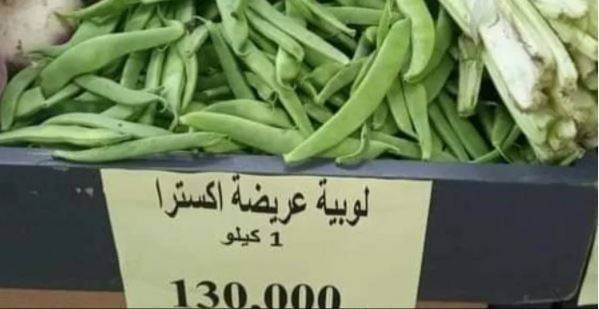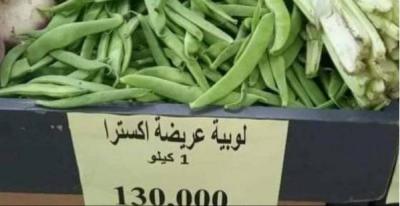Days before the arrival of Ramadan, vegetable prices in Lebanon have seen an unprecedented rise, coinciding with surges in the dollar and fuel prices against the backdrop of local crises and the ongoing war in Ukraine. For example, the price of a kilogram of cucumbers has reached 30,000 Lebanese pounds, while the price of a kilogram of tomatoes has reached 25,000 pounds in some stores. Lebanese citizens are concerned about the repercussions of the war and the global fuel crisis on one hand and the instability of the dollar exchange rate in the parallel market on the other.
**"For Show Only"**
In the vegetable market in the capital, Yusuf from Beirut stated, "This year is unlike any other. People walk past the vegetable stands, ask about prices, and continue on their way. A plate of tabbouleh now costs 50,000 Lebanese pounds." He explained: "For an average-income citizen, this has become nearly impossible and unacceptable. Prices change from day to day," and he questioned: "Where will we end up? Who is responsible? We don’t know." A shop owner mentioned: "The price of a kilogram of green beans has reached 120,000 Lebanese pounds. Passersby take photos of the prices with the green beans and share them on social media. They are content with that."
In this context, a member of the National Agricultural Committee in the Economic Authorities, Khair Jarrah, indicated that "the increase in vegetable and leafy green prices at this time is relatively justified, as they do not grow in the Bekaa Valley, which is a primary source of vegetables in Lebanon, until mid-April." Jarrah added in an interview with Sky News Arabia: "The current source of vegetables is the coastal plains near the sea, plastic greenhouses, or imports from Syria. The cost of production is high currently due to the rising prices of fertilizers and fuel for operating generators and pumps with the almost complete power outage. However, unfortunately, there is exploitation of the consumer, in the absence of oversight from the relevant ministries."
On another note, the head of the Consumer Protection Association, Zohair Bro, said: "When the dollar price dropped from 34,000 pounds down to 20,000, this decline was artificial and executed by the Banque du Liban to preempt the upcoming parliamentary elections and navigate through a phase of relative stability. This cost the Banque du Liban hundreds of millions of dollars intervening in the cash market to curb the dollar price without any real changes to address the already deteriorating economic situation in Lebanon." Bro added in his remarks to Sky News Arabia: "It seems that with the movement of banks and pressure on the governor of the Banque du Liban, the dollar has started to rise again, which we anticipated. We said then that this situation requires a fundamental solution to the economic problems and the ongoing crisis." He concluded by saying: "This trajectory results from unchanged economic policies, and what happened was a play with the dollar to reduce its price in a limited context. Commodity prices dropped by only 4 percent while the dollar price had previously decreased by 42 percent. This means that large traders kept prices significantly high because they would not risk lowering consumer goods and food prices, knowing full well that the drop was artificial and wouldn't last, as the dollar would rise again, leaving them to bear the cost from their assets."




